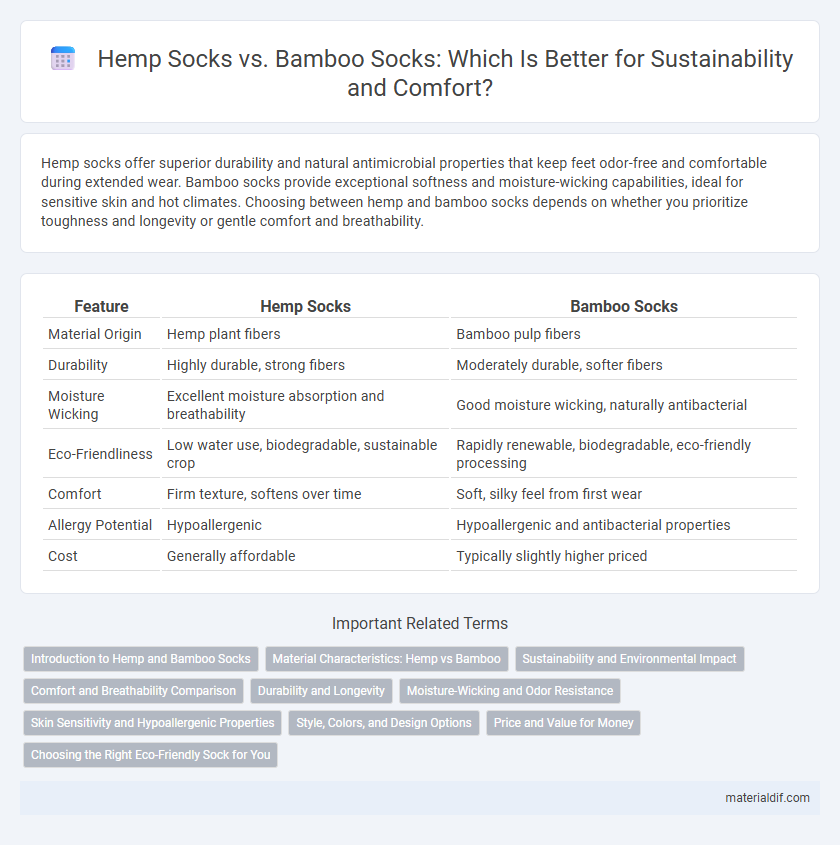Hemp socks offer superior durability and natural antimicrobial properties that keep feet odor-free and comfortable during extended wear. Bamboo socks provide exceptional softness and moisture-wicking capabilities, ideal for sensitive skin and hot climates. Choosing between hemp and bamboo socks depends on whether you prioritize toughness and longevity or gentle comfort and breathability.
Table of Comparison
| Feature | Hemp Socks | Bamboo Socks |
|---|---|---|
| Material Origin | Hemp plant fibers | Bamboo pulp fibers |
| Durability | Highly durable, strong fibers | Moderately durable, softer fibers |
| Moisture Wicking | Excellent moisture absorption and breathability | Good moisture wicking, naturally antibacterial |
| Eco-Friendliness | Low water use, biodegradable, sustainable crop | Rapidly renewable, biodegradable, eco-friendly processing |
| Comfort | Firm texture, softens over time | Soft, silky feel from first wear |
| Allergy Potential | Hypoallergenic | Hypoallergenic and antibacterial properties |
| Cost | Generally affordable | Typically slightly higher priced |
Introduction to Hemp and Bamboo Socks
Hemp socks offer exceptional durability and natural antimicrobial properties, making them ideal for long-lasting comfort and odor control. Bamboo socks provide softness and moisture-wicking capabilities, ensuring breathability and a gentle touch on the skin. Both materials are sustainable options, but hemp is known for its superior strength and environmental resilience compared to bamboo.
Material Characteristics: Hemp vs Bamboo
Hemp socks offer exceptional durability and natural antimicrobial properties, making them ideal for long-lasting wear and odor resistance. Bamboo socks are known for their superior softness, moisture-wicking ability, and hypoallergenic qualities, providing a comfortable fit for sensitive skin. Both materials are sustainable, but hemp fibers are stronger and more abrasion-resistant, while bamboo excels in breathability and smooth texture.
Sustainability and Environmental Impact
Hemp socks demonstrate superior sustainability due to hemp's rapid growth, requiring less water and pesticides compared to bamboo, which often demands intensive chemical processing for fabric production. The environmental impact of hemp is lower as it enhances soil health through phytoremediation and carbon sequestration, while bamboo cultivation can contribute to deforestation and biodiversity loss if not responsibly managed. Choosing hemp socks supports eco-friendly manufacturing practices and reduces the overall carbon footprint relative to bamboo alternatives.
Comfort and Breathability Comparison
Hemp socks offer superior durability and natural antimicrobial properties, making them highly breathable and moisture-wicking for all-day comfort. Bamboo socks are known for their softness and excellent temperature regulation, providing a silky feel and effective odor control. Both materials enhance foot comfort, but hemp excels in long-lasting breathability while bamboo prioritizes softness.
Durability and Longevity
Hemp socks offer superior durability compared to bamboo socks due to hemp fibers' natural strength and resistance to wear and tear, ensuring longer-lasting use even in rugged conditions. Bamboo socks, while softer and more breathable, tend to lose shape and integrity faster because their fibers are less robust under frequent washing and heavy use. Choosing hemp socks guarantees enhanced longevity, making them a sustainable and cost-effective option for long-term comfort and performance.
Moisture-Wicking and Odor Resistance
Hemp socks outperform bamboo socks in moisture-wicking due to hemp fibers' superior breathability and ability to absorb sweat effectively. The natural antimicrobial properties of hemp reduce odor build-up more efficiently than bamboo, keeping feet fresher for longer. Hemp's durability also ensures consistent performance in moisture management and odor resistance over extended wear.
Skin Sensitivity and Hypoallergenic Properties
Hemp socks offer superior hypoallergenic properties compared to bamboo socks, making them ideal for sensitive skin due to their natural antimicrobial and breathable fibers that reduce irritation and moisture buildup. Hemp fabric's durability and ability to wick away sweat help prevent common allergens and bacteria from irritating the skin, whereas bamboo fibers, while soft, may retain more moisture leading to potential skin sensitivity. Choosing hemp socks supports comfort and skin health for individuals prone to allergies and irritations.
Style, Colors, and Design Options
Hemp socks offer a rugged, natural aesthetic with earthy tones like olive, beige, and charcoal, often featuring minimalistic or rustic designs that appeal to eco-conscious consumers. Bamboo socks provide a softer, silkier texture and come in a wider array of vibrant colors and modern patterns, catering to those seeking both comfort and contemporary style. Both materials support sustainable fashion choices, but hemp emphasizes durability and organic appeal, while bamboo highlights softness and variety in design.
Price and Value for Money
Hemp socks generally offer better durability and natural antimicrobial properties compared to bamboo socks, making them a cost-effective choice in the long run despite a slightly higher initial price. Bamboo socks may come at a lower upfront cost but typically wear out faster, reducing their value for money over time. Investing in hemp socks provides superior longevity and comfort, delivering greater overall value despite price differences.
Choosing the Right Eco-Friendly Sock for You
Hemp socks offer superior durability and natural antimicrobial properties, making them ideal for long-lasting, odor-resistant wear. Bamboo socks provide exceptional softness and moisture-wicking capabilities, perfect for sensitive skin and hot climates. Selecting eco-friendly socks depends on balancing durability, comfort, and environmental impact to match your lifestyle needs.
hemp socks vs bamboo socks Infographic

 materialdif.com
materialdif.com